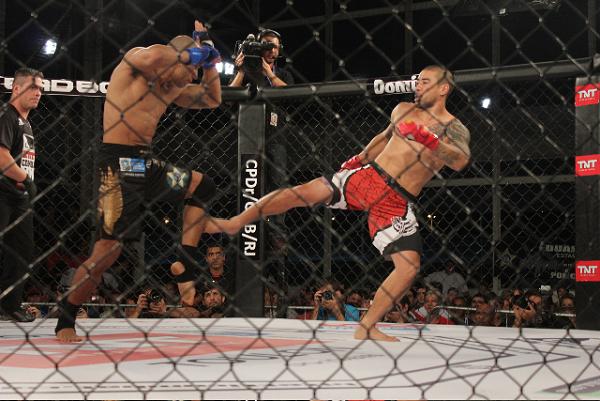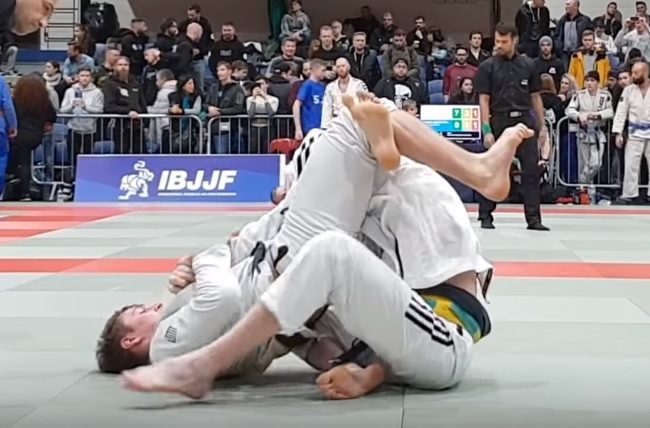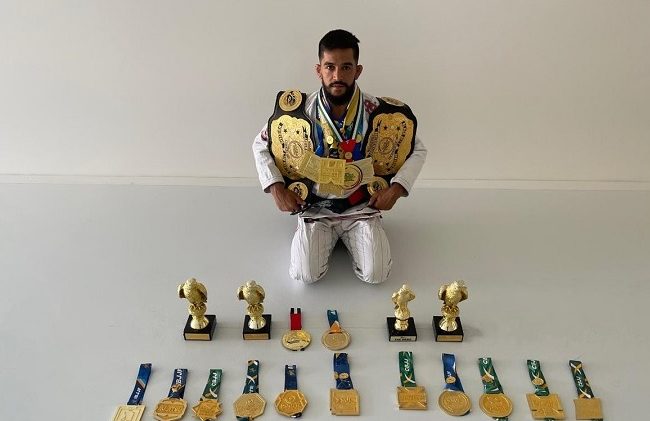
Eduardo Herdy, wearing blue gloves, at Bitetti Combat Rocinha last May 4 / Photo: Allen Silva/Publicity
The Jiu-Jitsu and boxing instructor at CORE, an elite police force in Rio de Janeiro, Eduardo Herdy has been turning heads for his performances in MMA. Schooled in Jiu-Jitsu by Osiris Maia and taught boxing by Ricardo Tinha, Herdy is unbeaten in MMA so far, notching his second win last May 4 at Bitetti Combat Rocinha, where he took on Paraná Fight Team’s Ronaldo Arada Milan.
So does doing Jiu-Jitsu and MMA make Herdy any better of an elite police trooper? GRACIEMAG.com was curious to find out, so we had the following conversation with the upbeat welterweight.
Why do you fight?
I fight for glory. As it goes in the Brazilian national anthem, I want “future peace and past glory.” When I’m older, I want to be able to look back and enjoy all this. Fighting also entails evolving much quicker. By being in contact with fighters from different schools, your technical level improves and, as a consequence, it reflects in your training partners and your academy as a whole. In my opinion it all starts with training. Training lasts for months, years; the fight itself may last but a few minutes. My goal in MMA is to reach the top. I want lots of belts. It wasn’t without reason that I was in reserve fights at the Bitetti Combat 10 GP and BC 11 under-70 kg GP. If someone was unable to continue, I was there hungry for a shot. Either way, I don’t make plans; I just like fighting.
http://www.youtube.com/watch?v=PcmKtoy62I0
In the photo you sent in to us you seem to have gone Thai. What goes on in your head when you’re doing MMA?
Truth is, I didn’t just happen to fight like that. I’ve been training Thai boxing for a long time now, ever since 1995, at Brazilian Fight academy with Osiris Maia. I have the honor of having received two black belts from the grandmaster: one in Jiu-Jitsu and the other in Thai boxing. And I can’t leave out Ricardo Tinha, who got my hands up to speed in boxing. I get more confident standing with every fight. On my debut, in 2011, I feel I did well. I felt more prepared in my second fight. Thus I forge ahead, training hard, fighting and evolving. I plan to be even better for my third outing. My record’s coming along nicely, two fights and two first-round knockouts.
What do the guys with pure Jiu-Jitsu backgrounds get wrong most in MMA?
Getting scared and trying to take it to the ground any way they can. A striker’s objective, besides hurting his adversary, is to frustrate grapplers’ attempts at taking it to the ground. If that’s all the grappler has up his sleeve, he’s going to lose. Even if ground fighting is his mainstay, he should train till getting to a point where he’s comfortable on his feet. After all, that’s where the fight starts.
Do you have any suggestions for police officers who want to be safe in carrying out there duties?
I always study cases that arise, learn and refresh my knowledge. It’s key that you study to learn from past mistakes; analyze where others went wrong, which unfortunately happens; see where you can improve; and most importantly, use good judgment. All that goes for everything in life, and it’s no different in police work.
What self-defense technique should policemen master?
Police should avoid hurting citizens, andI feel there’s nothing better than Jiu-Jitsu for that. Gentle-art control positions are excellent for police work. Obviously, there are some differences, since the police can’t go exposing their firearms. There’s a difference compared to traditional Jiu-Jitsu positions. I feel that for beginners, practicing three times a week is enough, if just for the excellent physical exercise the martial art provides.



